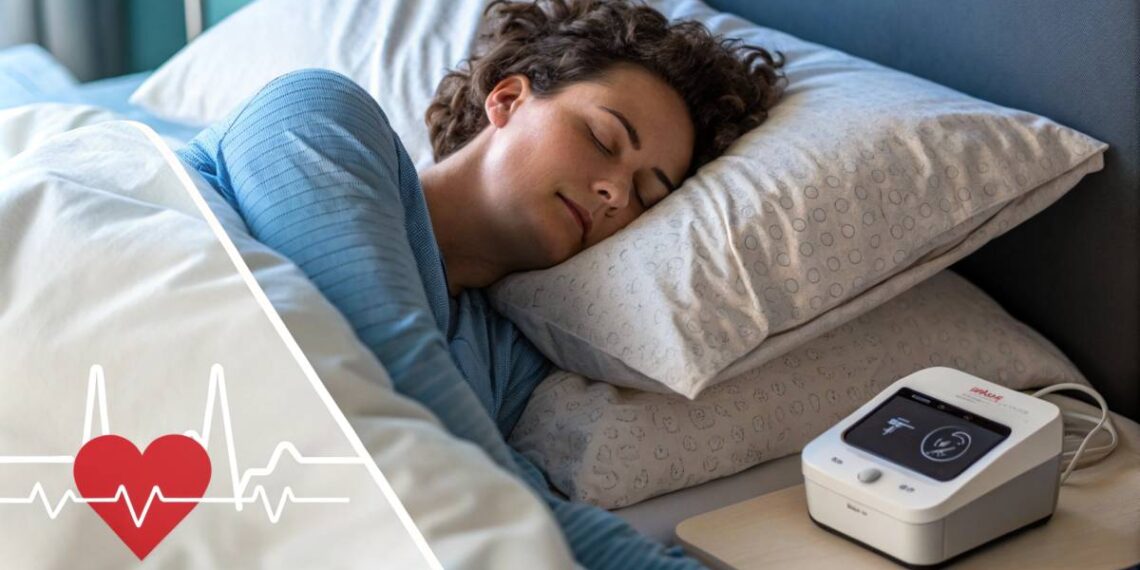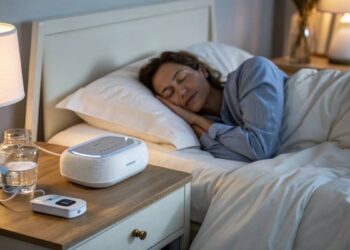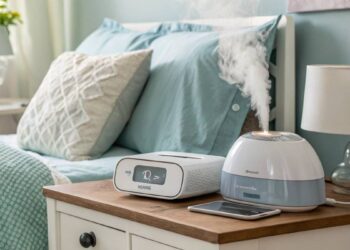Imagine waking up every morning feeling more tired than when you went to bed. Sleep apnea silently steals your restful nights, leaving a trail of health issues in its wake. Beyond the obvious fatigue, this common sleep disorder poses serious risks to your heart, increasing the likelihood of high blood pressure, heart disease, and even stroke. Understanding the intricate link between sleep apnea and heart health is crucial for taking proactive steps toward a healthier, more energized life. Dive into this comprehensive guide to uncover how sleep apnea affects your heart and discover effective strategies to reclaim your well-being.
Key Takeaways
- Sleep Apnea Types: Differentiates between obstructive and central sleep apnea, detailing their unique causes and impacts.
- Heart Health Risks: Explores the direct connection between untreated sleep apnea and increased risks of high blood pressure, heart disease, atrial fibrillation, and stroke.
- Risk Factors: Identifies key contributors to heart problems related to sleep apnea, including obesity, age, snoring partners, and commercial driving.
- Management Challenges: Highlights obstacles in managing sleep apnea, such as CPAP intolerance, pediatric sleep apnea, and post-menopausal women’s struggles.
- Symptoms and Effects: Lists common symptoms of sleep apnea and the severe health consequences of leaving the condition untreated.
- Diagnosis and Treatment: Outlines the importance of accurate diagnosis and a range of treatment options, from CPAP therapy to surgical interventions and lifestyle changes.
The Link Between Sleep Apnea and Heart Health
Understanding Sleep Apnea
Sleep apnea is like that uninvited guest at a party that won’t leave, popping in during your sleep and cutting off your breathing. These breathless moments can stretch from seconds to minutes and reappear throughout the night. You’ve mostly got two troublemakers here: obstructive sleep apnea (OSA) and central sleep apnea, each having its own reasons to crash your health party. Curious about how these types stack up against each other? Peek into our article on central vs obstructive sleep apnea.
“Untreated sleep apnea is a ticking time bomb for your heart, escalating the risk of severe cardiovascular conditions.” – Dr. Emily Richards, Cardiologist
When oxygen dips during these interruptions, your body might nudge you awake to start breathing again, and you may not even notice. Often, it takes a partner to alert someone about their noisy breathing or snoring habits. If ignored, this problem can really mess with your well-being, especially your ticker.
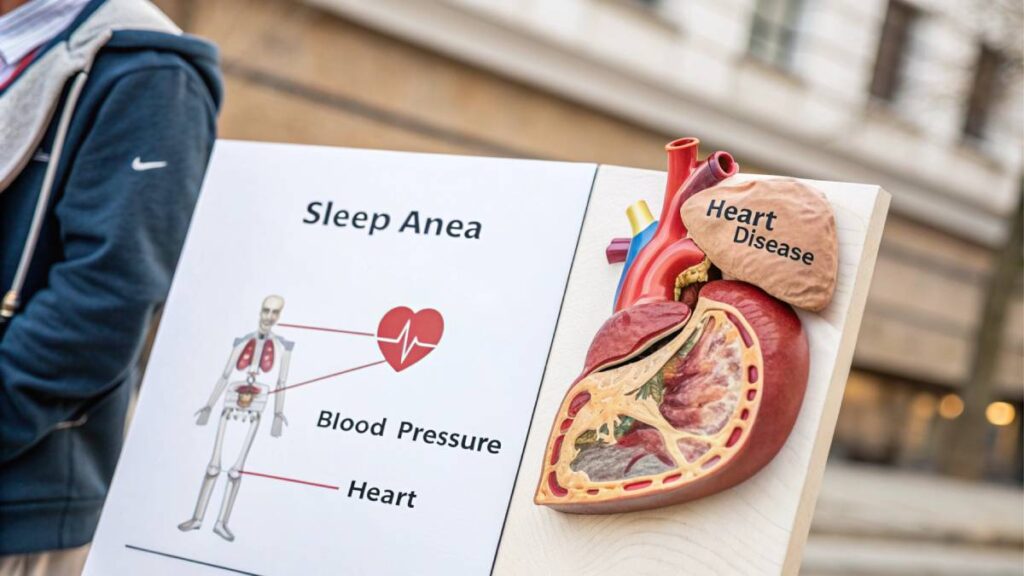
Impact of Sleep Apnea on Heart Health
There’s pretty solid evidence pointing fingers at sleep apnea for some serious heart issues. Repeated breathlessness can push your blood pressure sky high, spark inflammation, and invite other heart troubles to the mix. Here’s a snapshot of what untreated sleep apnea might bring:
| Health Problem | What’s It About? |
|---|---|
| High Blood Pressure | Those breathless nights make your blood pressure soar, which might mean heart disease could be lurking. |
| Heart Disease | Chronic apnea can roll out the welcome mat for heart attacks and other heart headaches. |
| Atrial Fibrillation | People with this sleep issue are playing with fire when it comes to irregular heartbeats and stroke risks. |
| Stroke | Going for long without breath can mess with your heart, upping the stroke stakes. |
That bond between sleep apnea and heart problems shows how crucial it is to catch and tackle this early. Being aware of signs like loud snoring, gasping during sleep, and that ever-present daytime drowsiness is a good start. For the full scoop on symptoms, check out our piece on sleep apnea symptoms.
Getting a handle on sleep apnea not only helps you snooze better but also dodges those scary heart conditions. Solutions include mixing lifestyle tweaks, medical treatments, and even some offbeat healing methods. If you’re all about deep dives, see our chatter about does weight loss help sleep apnea and sleep apnea surgery success rate for juicy details on the battle against sleep apnea.
Risk Factors for Heart Problems
You’d be amazed at how much the risks of heart issues are tied to sleep apnea. Spotting ’em early can make a massive difference in managing the condition and keeping your ticker happy.
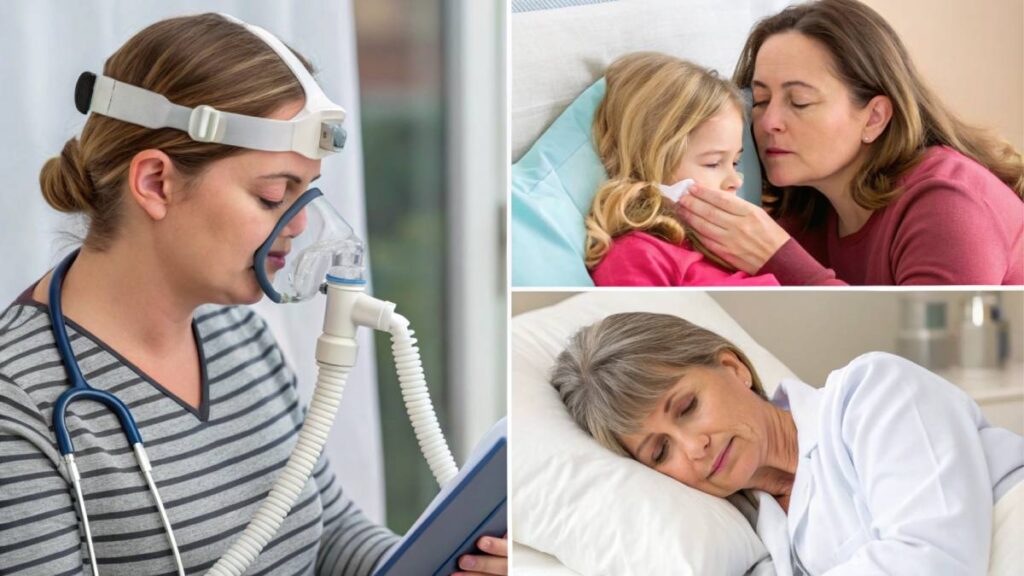
Overweight and Obesity
Carrying extra baggage around, especially when it comes to weight, is like asking for trouble with sleep apnea and heart health. That extra fluff around the neck doesn’t just sit there; it chokes up the airway when you’re catching Zs. Good news though—losing some pounds can really dial down those pesky apnea symptoms. Here’s a little chart action for you:
| Shedding Weight (%) | Drop in AHI (Apnea-Hypopnea Index) |
|---|---|
| 5% | 26% |
| 10% | 50% |
| 15% | 70% |
Getting this under control can be a game changer. Check out does weight loss help sleep apnea for the skinny on this.
Age and Sleep Issues
Getting older isn’t just about wisdom and gray hairs. It’s also about sagging muscles, including ones around your throat, which can mess with your snooze time. The stats don’t lie:
| Age Group | Sleep Apnea Odds (%) |
|---|---|
| 30-39 | 3% |
| 40-59 | 13% |
| 60+ | 30% |
So keep your eye on those sleep signals as you add candles to the cake. Curious about what to look for? Hit up sleep apnea symptoms to get the scoop.
Partners of Heavy Snorers
If you’re snuggling up to a human chainsaw every night, guess what? You might be at risk, too! That loud snoring could mean your sleep buddy has some serious blocked airways going on. Stay sharp and help ’em get checked out. Your ears—and relationship—will thank you.
Commercial Drivers Needing DOT Certification
Hey, truckers! Losing sleep is not just about catching a boring drive without a nod off. Your safety (and that license) depends on it. Sleep disorders like apnea are more than just risky—they could cost your DOT certification. Getting it sorted means you’re not only safe but set for the long haul. Peek at home sleep apnea test for ways to stay savvy on this.
Figuring out these risk factors isn’t just about dodging heart drama—it’s about feeling better all around. Nip sleep apnea in the bud, and you’re golden!
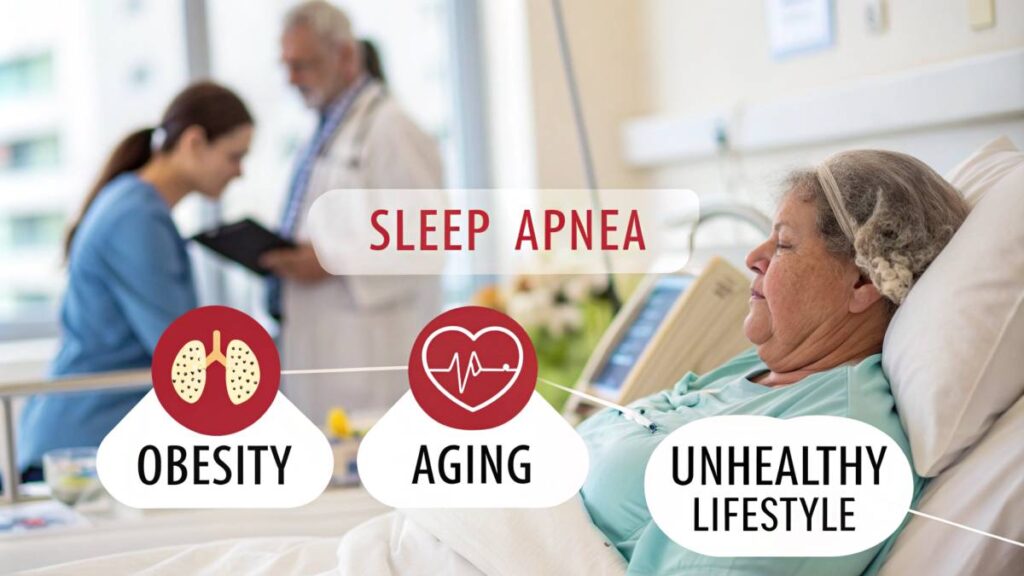
Challenges in Managing Sleep Apnea
Dealing with sleep apnea isn’t just a walk in the park. Some folks face bumpier paths than others, like those who can’t bear the thought of CPAP therapy, parents wringing their hands over their kid’s snooze struggles, and ladies trying to navigate this post-menopause rollercoaster.
“Effective management of sleep apnea requires a multifaceted approach, combining medical treatment with lifestyle adjustments to protect heart health.” – Dr. James Anderson, Sleep Specialist
Individuals Who Can’t Stand CPAP Therapy
Lots of people given a one-way ticket to the CPAP club find sticking with it a real pain. Why, you ask? Imagine trying to sleep with a mini jet engine strapped to your face! It’s not super comfy, the mask feels like a tight hug they didn’t ask for, and those noisy gadgets can make bedroom peace disappear. Sometimes folks even feel itchy or sore from the mask. All this hassle often leads to more tossing and turning instead of snoozing like a baby.
| Resistance Reasons | How Many Say “No Thanks” |
|---|---|
| Mask feels ick | 42% |
| Machine’s a racket | 30% |
| Feeling stuck | 25% |
| Mask mucking with skin | 18% |
For those nodding along, swapping CPAP out for gadgets like mouth bits or even grandma’s secret sleep recipes can be worth a shot.
Parents With Kids Tossing and Turning
Worried moms and dads keeping an eye on their kids’ late-night loudness might be dealing with sleep apnea. Unlike adults, kiddos’ snoring can sound like a symphony, mixed with some gasping and nighttime wake-ups fit for a horror story. It’s important to keep an eagle eye on these pediatric sleep apnea signals and ring up the doc like yesterday.
Kids with apnea aren’t just little snore-factories—they might also start tripping over their thoughts and bouncing off the walls during the day. High time to chat with a doctor to nail down a plan that keeps both kiddos and parents sleeping tight.
Women Handling the Post-Menopause Ride
When menopause hits, sleep can turn into a jigsaw puzzle with some pieces missing. With hormones playing hide and seek, the scale might not be their best buddy anymore, and they may find themselves carrying a little extra baggage—hello, sleep apnea!
| Factors Messing Up Sleep | How They Stick It To Women |
|---|---|
| Hormones playing games | Sleep apnea buddy |
| Extra pounds | Big bad factor |
| Dreams disrupted | Nightly drama |
Getting a grip on sleep apnea for these women means tackling these puzzle pieces head-on, from shedding extra weight to trying out some bed-friendly yoga moves. If you’re wondering about the weight angle, check out our piece on does shedding pounds help with sleep apnea.
Grasping these hurdles is the name of the game. Folks can work hand-in-hand with doctors to figure out a game plan that helps them catch those elusive Z’s.
Recognizing the Signs and Symptoms
Knowing about sleep apnea is vital for anyone at risk of sleep-related heart trouble. Spotting the symptoms can make a big difference, leading to faster diagnosis and better treatment.
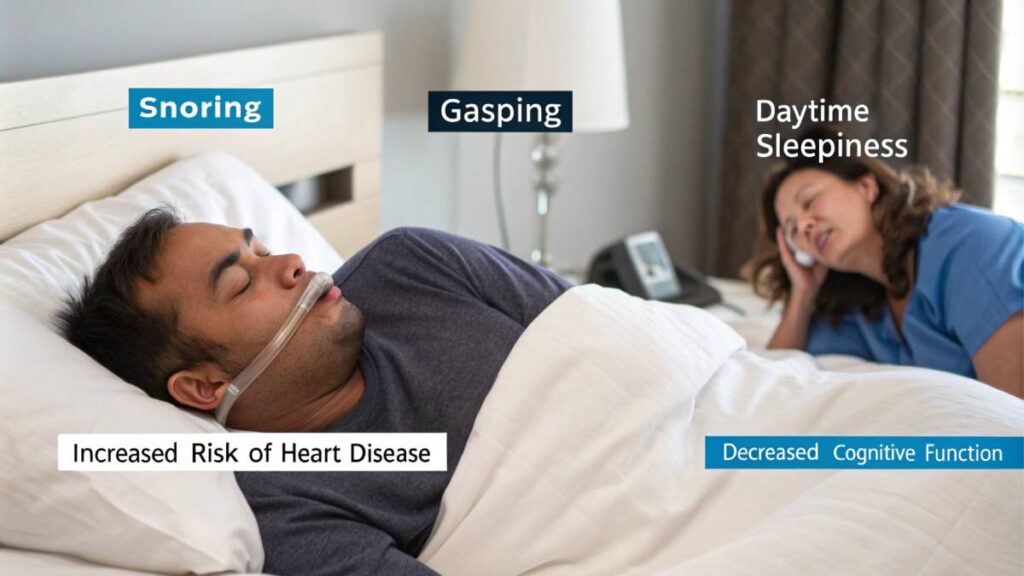
Common Symptoms of Sleep Apnea
Sleep apnea doesn’t show up the same in everybody. People often report different things. Here’s a list of the most common symptoms:
| Symptom | Description |
|---|---|
| Loud Snoring | Constant, loud snoring might be a red flag. |
| Gasping or Choking | Folks might wake up suddenly, feeling like they can’t breathe. |
| Daytime Sleepiness | Can’t keep your eyes open during the day? It might be from all those interrupted zzzs. |
| Morning Headaches | Waking up with a headache could be a sign your sleep isn’t restful. |
| Difficulty Concentrating | A foggy brain could be due to poor sleep quality. |
| Irritability or Mood Changes | Feeling grumpy or on edge? Bad sleep might be the culprit. |
Want a bigger list and more info? Dive into our article on sleep apnea symptoms.
Effects of Untreated Sleep Apnea
Ignoring sleep apnea is a gamble with your health. Left unchecked, it could lead to:
| Health Effect | Description |
|---|---|
| High Blood Pressure | Sleep apnea pushes blood pressure up, putting extra strain on the heart. |
| Heart Disease | Skipping treatment could spike the chances of heart problems, even heart attacks. |
| Stroke | Poor sleep oxygen levels can skyrocket the risk of a stroke. |
| Diabetes | Sleep apnea messes with your metabolism, raising the stakes for type 2 diabetes. |
| Depression | Sleep chaos can stir up or worsen feelings of depression. |
Catching these signs early can steer you toward the right treatment. Looking for more details on causes or treatments? Check out our piece on what causes sleep apnea.
Seeking Diagnosis and Treatment
When it comes to understanding how sleep apnea messes with your heart health, it’s huge for anyone dealing with this snore-worthy condition. Your first move in beating this? Getting the right diagnosis. No brainer, right?
Importance of Diagnosis
Getting the lowdown on your sleep apnea is a big deal. It helps your doc figure out just how bad it is and whip up a treatment that’s just right for you. If you ignore it, you’re rolling the dice with stuff like heart trouble, sky-high blood pressure, or even a stroke. Not cool.
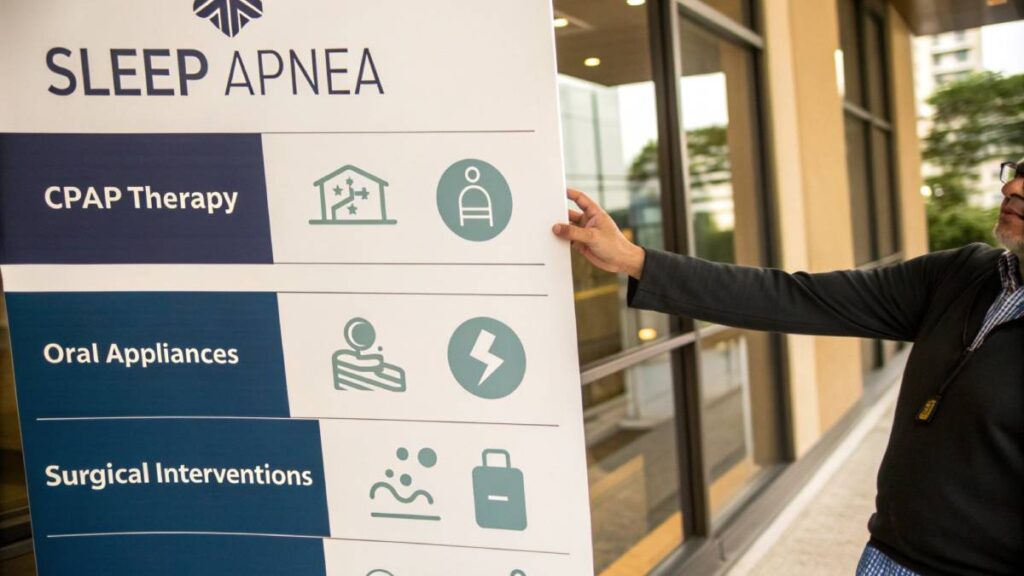
Getting checked out typically involves a bunch of different tests. You might fill out some surveys about how you snooze, or go through a home sleep apnea test to see what’s up. Knowing what’s going on helps figure out if you’re dealing with obstructive or central sleep apnea. Check out our breakdown on central vs obstructive sleep apnea for the full scoop.
| Diagnostic Method | Description |
|---|---|
| Sleep Study | Keeps an eye on how you sleep, your heartbeat, and your breath. |
| Home Test | Cheks your breathing and oxygen level while catching Zs. |
| Questionnaires | Sizes up symptoms linked with sleep apnea. |
Treatment Options for Sleep Apnea
Once you’ve got your diagnosis, treating sleep apnea ain’t a one-size-fits-all. It all comes down to how severe things are and what your health is like.
- Continuous Positive Airway Pressure (CPAP): This machine is the go-to for keeping those airways open while you snuggle in at night. Not a fan of CPAP? You’re not alone so check out alternatives in our guide on alternatives to cpap.
- Lifestyle Changes: Losing weight if you’ve got some extra pounds can really help. Even a little trim can make a big difference in how you breathe while logging winks (does weight loss help sleep apnea).
- Oral Appliances: These gadgets are custom-made to keep your airways clear while you snooze. They might be the ticket if CPAP ain’t your jam.
- Surgery: When things are tough, some folks might need surgery to nip extra throat tissue or fix stuff that’s messed up. See how it works out in our piece on sleep apnea surgery success rate.
- Natural Remedies: Some folks go the earthy route with natural tricks to chill their symptoms. Peek at our natural sleep apnea remedies for a rundown on holistic hacks.
By catching the signs early and diving into resources like our article on sleep apnea symptoms, you can step up your game towards better health and keep those sleep apnea heart problems from cramping your style.
Main Tips
- Maintain a Healthy Weight: Reducing excess weight can significantly alleviate sleep apnea symptoms and lower heart disease risks.
- Consistent Sleep Schedule: Establish regular sleep patterns to improve sleep quality and reduce apnea episodes.
- Use CPAP Correctly: Ensure your CPAP machine is fitted properly and used every night to maximize its benefits for your heart health.
- Monitor Symptoms: Keep track of sleep apnea symptoms and consult your doctor regularly to adjust treatment as needed.
- Stay Active: Regular physical activity enhances overall cardiovascular health and helps manage sleep apnea effectively.
Final Thoughts
Sleep apnea is more than just a nighttime nuisance; it’s a critical health issue with profound implications for your heart. By recognizing the symptoms and understanding the risks, you can take proactive steps to safeguard your cardiovascular health. Whether it’s through consistent use of CPAP therapy, exploring surgical options, or making essential lifestyle changes, managing sleep apnea effectively reduces the threat of serious heart conditions. Additionally, addressing risk factors like obesity and age-related muscle loss can significantly improve your sleep quality and heart health. Remember, early diagnosis and comprehensive treatment are key to mitigating the dangers of sleep apnea. Partnering with healthcare professionals ensures you receive personalized care tailored to your specific needs. Prioritize your sleep health today to enjoy a healthier, more vibrant life tomorrow.
Conclusion
Addressing the often-overlooked connection between sleep apnea and heart health is vital for safeguarding your overall well-being. This intricate relationship underscores the importance of early diagnosis and effective management of sleep apnea to prevent serious cardiovascular complications. From understanding the types and symptoms to recognizing the significant risk factors like obesity and age, each aspect plays a crucial role in shaping your health outcomes. While treatments such as CPAP therapy, oral appliances, and surgical options offer paths to relief, overcoming challenges like CPAP intolerance and catering to specific groups like children and post-menopausal women requires personalized strategies. Embracing lifestyle changes alongside medical treatments can further enhance the efficacy of managing sleep apnea. By staying informed and proactive, you can mitigate the heart-related risks associated with sleep apnea, leading to more restful nights and a healthier heart. Take control of your sleep health today to pave the way for a vibrant, energetic tomorrow.
Frequently Asked Questions
What is the connection between sleep apnea and heart health?
Sleep apnea disrupts normal breathing during sleep, leading to intermittent low oxygen levels and increased stress on the heart. This can result in high blood pressure, heart disease, atrial fibrillation, and a higher risk of stroke.
How does obesity influence sleep apnea and heart health?
Excess weight, especially around the neck, can obstruct airways, exacerbating sleep apnea symptoms. This obstruction increases the strain on the heart, elevating the risk of hypertension and other cardiovascular issues.
What are the common symptoms of sleep apnea that indicate heart problems?
Common symptoms include loud snoring, gasping for air during sleep, daytime sleepiness, morning headaches, difficulty concentrating, and mood changes. These symptoms can signal underlying heart stress caused by interrupted breathing.
How effective is CPAP therapy in reducing heart-related risks of sleep apnea?
CPAP therapy is highly effective in keeping airways open during sleep, reducing apnea episodes, lowering blood pressure, and decreasing the risks of heart disease and stroke when used consistently.
Can lifestyle changes alone manage sleep apnea and protect heart health?
While lifestyle changes like weight loss, regular exercise, and avoiding alcohol can significantly reduce sleep apnea symptoms and improve heart health, they are often most effective when combined with medical treatments.

